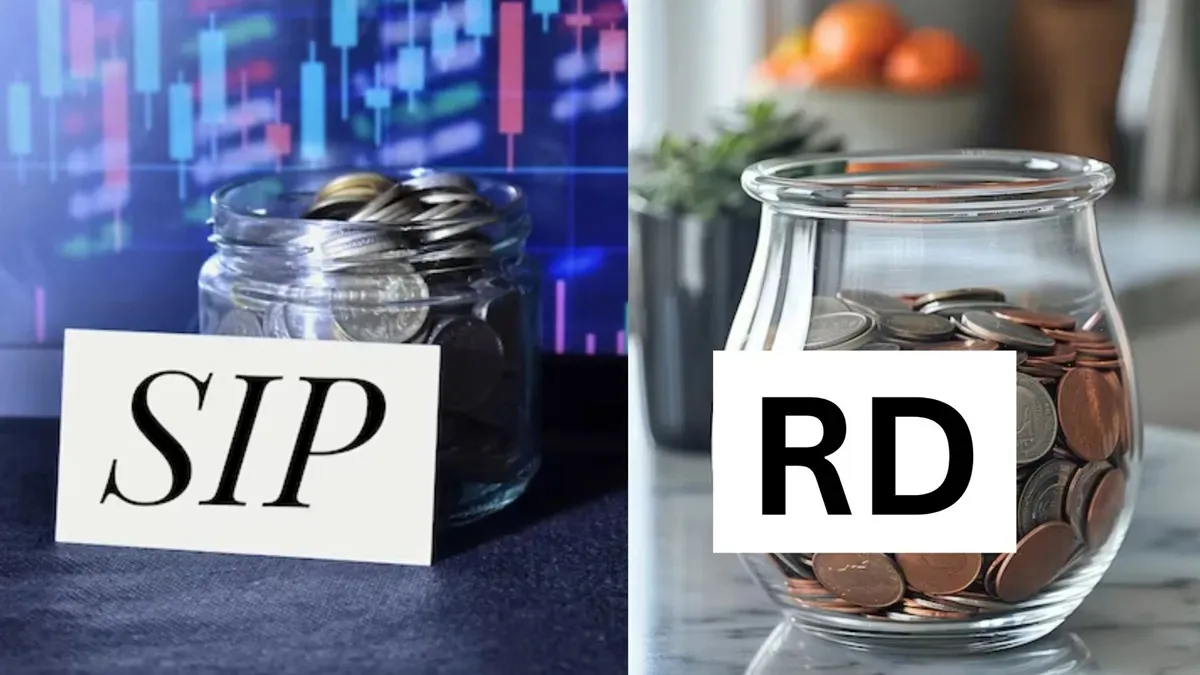SIP vs RD: When it comes to investment, the primary concerns that come to mind are returns and the safety of money. There are various investment options available, but here we are talking about SIP (Systematic Investment Plan) and RD (Recurring Deposit). The key question here is that if one has to choose between these two options, then which one they should go for? In which one will the decision to invest money be wise? Let us understand the difference between SIP and RD here and discuss what are their respective benefits.
What is SIP?
Systematic Investment Plan i.e. SIP, is an investment option that allows individuals to invest a fixed amount in mutual funds at regular intervals. It involves investing money in the market on a monthly or quarterly basis. Systematic Investment Plans work like recurring deposits, where a fixed amount is invested regularly over time.
What is RD?
Recurring Deposit or RD, is a financial instrument offered by banks that allows individuals to deposit a fixed amount at regular intervals for a fixed period. RD is considered a safe investment plan, ideal for individuals looking for short-term investment opportunities.
RD vs SIP: Which is better?
Type of investment: Investors deposit a fixed amount at regular intervals (monthly, quarterly or half-yearly) in the bank account linked to the RD. Whereas in SIP, investors invest in a mutual fund scheme at predetermined intervals (weekly, monthly or yearly). The amount invested buys units of the chosen fund at the current net asset value (NAV).
Returns: RD offers fixed interest rates which generally range between 5 per cent to 9 per cent. There are slightly higher rates for senior citizens. These rates are locked for the entire period. Whereas in SIP, returns are not guaranteed. It may fluctuate depending on the mutual fund type chosen (equity or debt) and overall market performance. By the way, if we look at the returns, equity SIP has given returns between 12 per cent to 22 per cent in the last 5-10 years.
Duration: RD offers a fixed maturity period ranging from 6 months to 10 years. Investors receive the principal amount along with the accumulated interest on maturity. Whereas there is no pre-determined period in SIP. Investors can continue investing for any desired period to achieve their long-term financial goals.
Investment plan options: RD offers limited flexibility. However, some banks may offer flexible RDs that allow occasionally missed installments with possible adjustments in the interest earned. While SIP offers more flexibility. Investors can choose between equity or debt funds based on their risk appetite and financial goals. Also, they can adjust the contribution amount according to changing financial circumstances or even pause the plan temporarily.
Risk: RD is considered a low-risk investment as it guarantees a fixed interest rate. The principal amount is also completely safe. Whereas SIP has inherent market risk, especially with equity SIPs. However, investing for a longer period can help mitigate market volatility and potentially reduce risk.
Taxation: Interest earned on RD is taxable as per the individual's tax slab. There are no tax exemptions or deductions. Taxation depends on the type of capital gains (short-term capital gains (STCG) or long-term capital gains (LTCG)) generated from the sale of SIP units.
Liquidity: Recurring deposits offer moderate liquidity. Although premature withdrawals are allowed, they are usually subject to a pre-closure penalty which can reduce the total interest earned. While SIPs generally have more liquidity than RDs. Investors can usually exit an SIP and withdraw the invested amount at any time, although exit load charges may apply if units are redeemed before a certain period.
Suitability: RDs are best suited for risk-averse investors who want safe and predictable investment options with guaranteed returns. While SIPs have a suitable investment strategy for both conservative and aggressive investors. Investors can benefit from the higher returns offered by equity SIPs.
What did you think in the end?
Obviously, you must be wondering how to decide. Actually, understand here that the choice between SIP (Systematic Investment Plan) and RD (Recurring Deposit) depends on your financial goals and risk tolerance. SIPs offer the possibility of high returns by investing in the market, but there is an inherent risk. On the other hand, RDs prioritise capital protection with fixed, guaranteed returns. SIPs are a great option for long-term wealth accumulation as they have the potential for growth. However, for individuals looking for short-term savings or assured, predictable returns, RDs offer stability.
Also Read: How to save more money with credit cards? | Know effective ways to do

